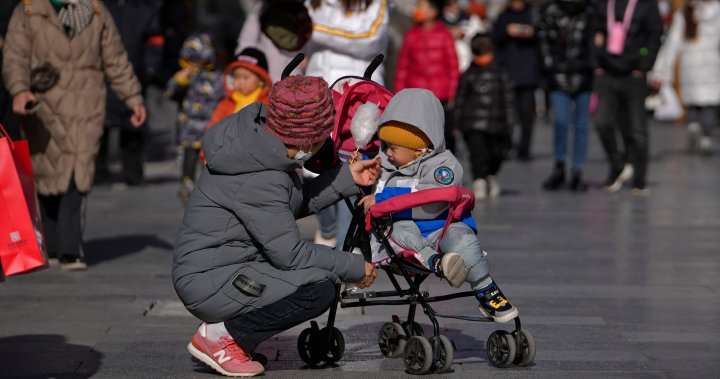
China records first population fall in decades. What’s behind the dip?
Global News
It wasn't clear if the population figures were affected by the COVID-19 outbreak that was first detected in the central Chinese city of Wuhan before spreading around the world.
For the first time in decades, China has fewer people than it did at the start of last year, according to official figures released Tuesday.
The world’s most populous country has worried for years about an aging citizenry’s effect on its economy and society, but its population was not expected to go into decline for almost a decade.
The National Bureau of Statistics reported that the country had 850,000 fewer people at the end of 2022 than the previous year. The tally includes only the population of mainland China, excluding Hong Kong and Macao as well as foreign residents.
Over one million fewer babies were born than the previous year amid a slowing economy and widespread pandemic lockdowns, according to official figures. The bureau reported 9.56 million births in 2022, compared to 10.62 million in 2021. Deaths rose from 10.14 million to 10.41 million.
It wasn’t immediately clear if the population figures were affected by the COVID-19 outbreak that was first detected in the central Chinese city of Wuhan before spreading around the world. China has been accused by some specialists of underreporting deaths from the virus by blaming them on underlying conditions, but no estimates of the actual number have been published.
China’s population has begun to decline 9-10 years earlier than Chinese officials predicted and the United Nation projected, said Yi Fuxian, a demographer and expert on Chinese population trends at the University of Wisconsin-Madison.
“China has become older before it has become rich,” Yi said.
China has sought to bolster its population since officially ending its one-child policy in 2016. Since abandoning the policy, China has sought to encourage families to have second or even third children, with little success, reflecting attitudes in much of east Asia where birth rates have fallen precipitously. In China, the expense of raising children in cities is often cited as a cause.





















 Run 3 Space | Play Space Running Game
Run 3 Space | Play Space Running Game Traffic Jam 3D | Online Racing Game
Traffic Jam 3D | Online Racing Game Duck Hunt | Play Old Classic Game
Duck Hunt | Play Old Classic Game











